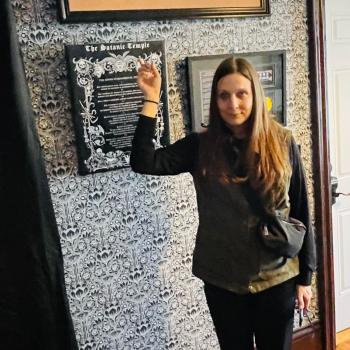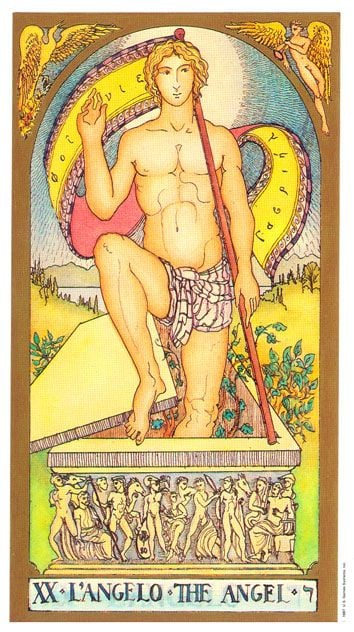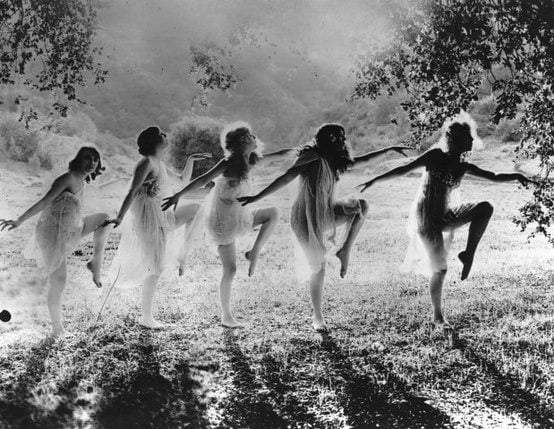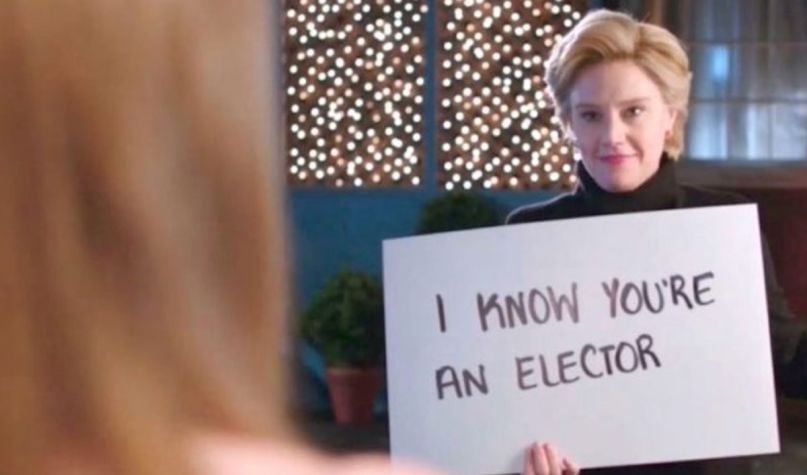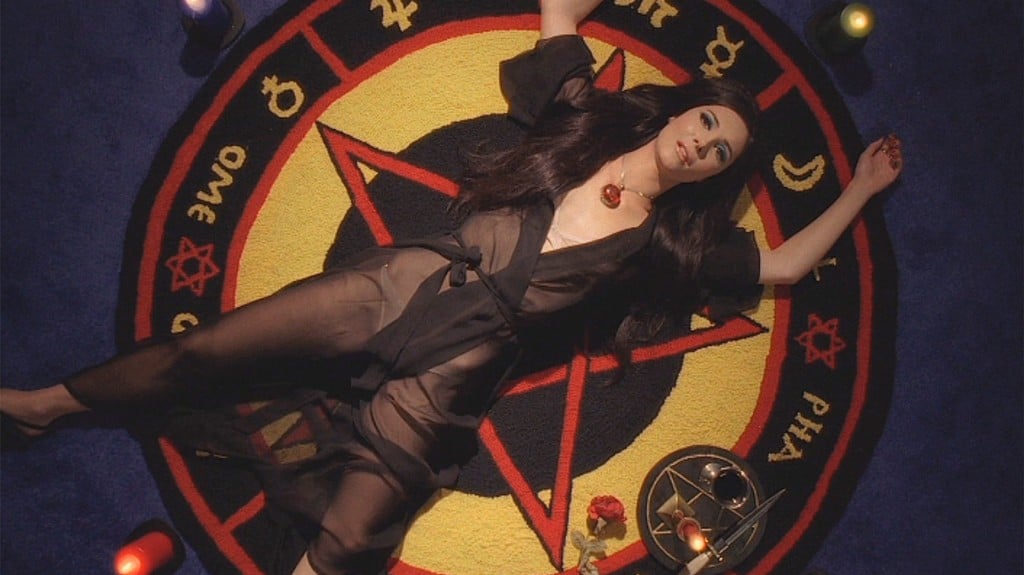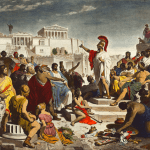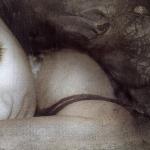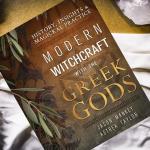 Over at the The Wild Hunt blog, there’s a discussion happening regarding a label on a bottle of beer. The company is called Lost Abbey, and the beer is called Witch’s Wit. The label depicts a witch burning at the stake, while hundreds of anonymous men look on. Jason Pitzl-Waters provides plenty of links to more information, and some of the remarks being made around the net. Rather oddly, given that the label has been in circulation for a couple of years now, a number of witches are up in arms, calling this artwork offensive. Some have even compared such imagery to depicting a black man being lynched, or a Holocaust victim being burned in the ovens at Dachau.
Over at the The Wild Hunt blog, there’s a discussion happening regarding a label on a bottle of beer. The company is called Lost Abbey, and the beer is called Witch’s Wit. The label depicts a witch burning at the stake, while hundreds of anonymous men look on. Jason Pitzl-Waters provides plenty of links to more information, and some of the remarks being made around the net. Rather oddly, given that the label has been in circulation for a couple of years now, a number of witches are up in arms, calling this artwork offensive. Some have even compared such imagery to depicting a black man being lynched, or a Holocaust victim being burned in the ovens at Dachau.
I am beyond offended…not by the image of the witch burning at the stake, but by the outrageous comparison to lynching or the Third Reich. The last time there were witch burnings in the western world was over 400 years ago. And those martyrs were Christians, not witches and sorcerers. The last time there was a lynching of a black person in the deep South was less than a half century ago. The last Jew burned in the German camps died in the 1940s. To invoke recent history as a parallel to ancient history is not only ignorant, it’s self-serving.
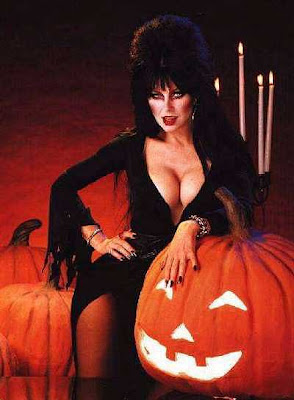
Every year, around this time, we see plenty of sensationalist, stereotyped portrayals of witches. There are those ugly old hag archetypes, straight out of Haxan: Witchcraft Through the Ages or The Wizard of Oz. Then there are the more modern, titillating depictions: the buxom, beautiful, sexy young witches in skimpy outfits, like Elvira, or the gals in The Craft. The witch, whether beautiful or ugly, young or old, enticing or frightening, is an archetypal image that will probably never go away. Those of us who call ourselves witches, who practice modern witchcraft, should be able to accept that this archetype is part of our history, our culture, and our heritage. Hell, some of us even wear those pointy hats and skimpy black outfits at Hallowe’en! How many of the female pagans protesting this label image have not done that at least once? You can’t have it both ways.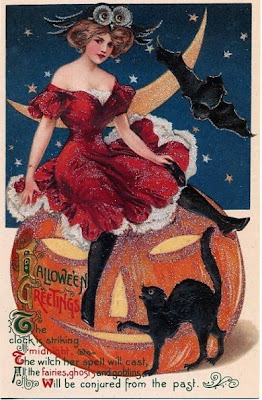
I’m not saying the label from Lost Abbey isn’t sexist, because it is, a bit. But I don’t think it’s thoughtless, nor do I think it’s anti-pagan. Their beers and labeling are thoughtfully conceived and executed with no small amount of humor or irony. Here, for example, is an excerpt from the description for their Inferno Ale: “Your roommate is an axe murderer. Eerily, he’s not threatening. How can he be? The Fallen Angel owns your body, mind and soul. As such, no one can take your life. It’s already been taken. Or was it given? Neither matters. Did you seriously think you were living a virtuous life? At least Satan serves beer in Hell. He brews it himself right there in that flame stoked cauldron.”
Clearly, these is some measure of humor intended here. I think maybe some of those witches choosing to be morally offended should lighten up a little bit. It’s also not really appropriate for modern pagan witches to align themselves with the martyred witches of the European witch craze or the North American witch trials. They were martyrs, victims, persecuted women and men, to be sure. But they weren’t witches! And if they did traffic in sorcery, I promise you, it was a far cry from the invented ceremonial rituals and nature worship that today’s witches practice. Today’s witches are mostly middle class white people, and we’re generally not in danger of being persecuted. We are, however, in danger of being misunderstood and ridiculed. And one way to bring ridicule upon oneself is to get morally indignant about imaginary persecution.
I think the reply from Lost Abbey, sent to one blogger protesting this issue, and posted on The Wild Hunt earlier as an update, is worth reposting here:
“I encourage you to look at all of Lost Abbey’s beers and consider them in context. Each of the Lost Abbey beers features a label which depicts a theme of Catholic excess — good and bad — on the front, and tells a moral story on the back. (Our founder is a recovering Catholic.)
In the case of Witch’s Wit, the back label is a story of the bad consequences of religious intolerance and oppression. The woman on the front is referred to as a “healer” on the label and accuses the Church of being narrow-minded and violent, threatening the same fate to anyone who would help the woman. The label ends with a note that this beer — a light, sweet and golden ale — is brewed in honor of that woman (and all those who died for their convictions).
Our other beers — Devotion, Deliverance, Judgment Day, Inferno, The Angel’s Share, etc. — all have similar messages of morality. Unfortunately, the people who started this meme either didn’t bother or didn’t care to actually read the label and simply chose to fan the flames of ignorance and intolerance — which, ironically, is what the beer is actually against.”
I also find it deliciously ironic that, like the majority of modern pagan witches, the brewery’s founder is a recovering Catholic.
People, we simply have bigger fish to fry. You want to help a witch who’s been persecuted? Go send a donation to the legal funds of the West Memphis Three; three young men wrongfully imprisoned for murder, in part because one of them, Damien Echols, was a practicing Wiccan who wore black and listened to heavy metal music, and was believed to be the ring leader of a satanic ritualistic killing of three young boys, and whose trial was a travesty of ignorance, fear and prejudice. If you want to protest the persecution of witches, then for goddess’ sake, help someone who has actually been wrongfully persecuted in the name of witchcraft.
UPDATE:
I did a bit of research and found some interesting links. I am guessing most of the folks protesting the beer label are not terribly familiar with craft microbrews. They’re very good, and expensive, and therefore not generally of interest to “drunks” or casual beer drinkers. Further, these small independent companies have a long and colorful history of beer names and labels that push the envelope of what some might call decorum, what others might call good taste. They are the indie cinema of beer, if you will. And many of them use supernatural imagery in their names and artwork.
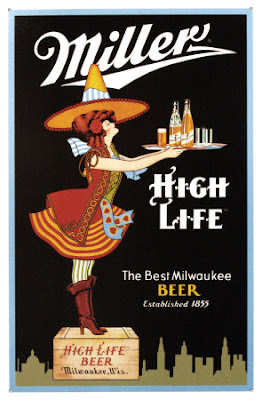 Check out Magic Hat, for example, or the Voodoo brewery in western PA. As for mainstream beers, Miller High Life has been using witch imagery in their advertising for a long time.
Check out Magic Hat, for example, or the Voodoo brewery in western PA. As for mainstream beers, Miller High Life has been using witch imagery in their advertising for a long time.
Moorhouse’s Blond Witch gets a good rating from Beer Advocate. Here’s a bar in Florida with a witchy name. And here’s a great craft brew label sure to incite protest!
And oh, look! A scholarly article about “beer witches” in the industry! And here’s some food for thought on beer witches in history. And some saints associated with beer.
Anyone else find some interesting links on witches and beer? Send ’em over!




